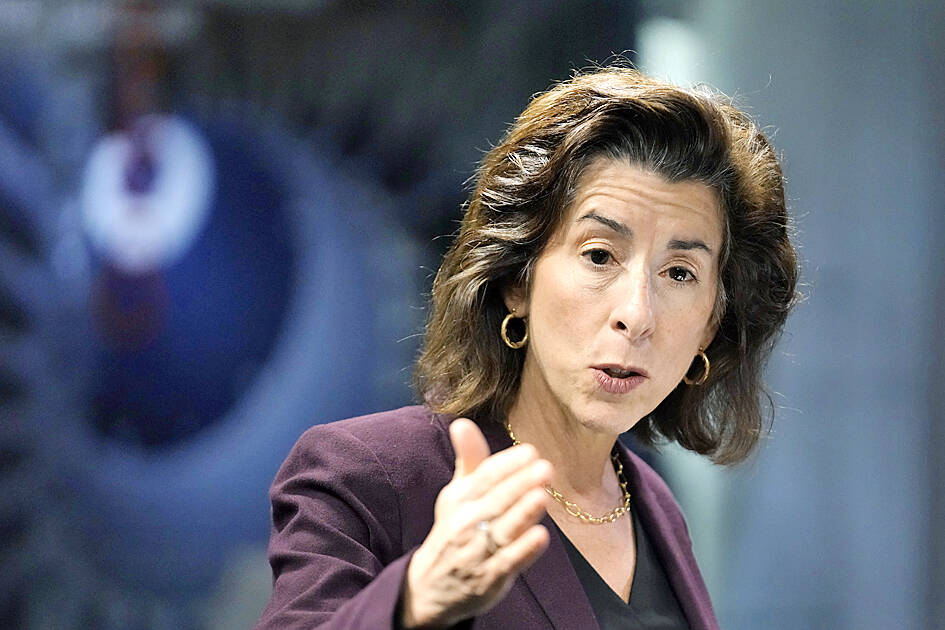US President Joe Biden’s administration on Friday announced the investment of US$5 billion in a newly established public-private consortium aimed at supporting research and development in advanced computer chips.
The National Semiconductor Technology Center (NSTC) is being funded through the CHIPS and Science Act. That 2022 law aims to reinvigorate the computer chip sector within the US through tens of billions of dollars in targeted government support.
Stakeholders in the chips industry gathered on the White House campus to discuss how the NSTC should prioritize research and worker training for an industry poised to expand because of government backing.

Photo: AP
COVID-19 exposed the risk to the US economy and national security of an overdependence on Taiwan for advanced chips, while the emergence of artificial intelligence (AI) is likely to drive demand for newer and more innovative chips.
“This is an inflection point in the industry,” US Secretary of Commerce Gina Raimondo told the group. “Not just because we’re dangerously dependent on one country for so many of our chips, but because AI is going to lead to an explosion of demand for chips, for sophisticated chips, more energy-efficient chips, cost-effective chips.”
The NSTC would help to fund the design and prototyping of new chips, in addition to training workers for the sector.
Companies say they need a skilled workforce to capitalize on the separate US$39 billion being provided by the government to fund new and expanded computer chip plants.
Officials are also working to prevent China from benefiting from NSTC-funded research, while filling gaps in the US research ecosystem for key areas such as packaging and hardware, Undersecretary of Commerce for Standards and Technology Laurie Locascio said in an interview.
“They’re investing quite a few dollars on chip design and chip manufacturing in China right now, as our main competitor,” Locascio said. “We are clearly thinking very, very hard about how we put up the right guardrails within our funding opportunities — how we protect IP, how we develop research security programs.”
Locascio added that US officials are “laser focused” on research security.
Additional reporting by Bloomberg

NATIONAL SECURITY: The Chinese influencer shared multiple videos on social media in which she claimed Taiwan is a part of China and supported its annexation Freedom of speech does not allow comments by Chinese residents in Taiwan that compromise national security or social stability, the nation’s top officials said yesterday, after the National Immigration Agency (NIA) revoked the residency permit of a Chinese influencer who published videos advocating China annexing Taiwan by force. Taiwan welcomes all foreigners to settle here and make families so long as they “love the land and people of Taiwan,” Premier Cho Jung-tai (卓榮泰) told lawmakers during a plenary session at the Legislative Yuan in Taipei. The public power of the government must be asserted when necessary and the Ministry of

Proposed amendments would forbid the use of all personal electronic devices during school hours in high schools and below, starting from the next school year in August, the Ministry of Education said on Monday. The Regulations on the Use of Mobile Devices at Educational Facilities up to High Schools (高級中等以下學校校園行動載具使用原則) state that mobile devices — defined as mobile phones, laptops, tablets, smartwatches or other wearables — should be turned off at school. The changes would stipulate that use of such devices during class is forbidden, and the devices should be handed to a teacher or the school for safekeeping. The amendments also say

EMBRACING TAIWAN: US lawmakers have introduced an act aiming to replace the use of ‘Chinese Taipei’ with ‘Taiwan’ across all Washington’s federal agencies A group of US House of Representatives lawmakers has introduced legislation to replace the term “Chinese Taipei” with “Taiwan” across all federal agencies. US Representative Byron Donalds announced the introduction of the “America supports Taiwan act,” which would mandate federal agencies adopt “Taiwan” in place of “Chinese Taipei,” a news release on his page on the US House of Representatives’ Web site said. US representatives Mike Collins, Barry Moore and Tom Tiffany are cosponsors of the legislation, US political newspaper The Hill reported yesterday. “The legislation is a push to normalize the position of Taiwan as an autonomous country, although the official US

CONSISTENT COMMITMENT: The American Institute in Taiwan director said that the US would expand investment and trade relationships to make both nations more prosperous The US would not abandon its commitment to Taiwan, and would make Taiwan safer, stronger and more prosperous, American Institute in Taiwan Director Raymond Greene said. “The US’ commitment to Taiwan has been consistent over many administrations and over many years, and we will not abandon our commitment to Taiwan, including our opposition to any attempt to use force or coercion to change Taiwan’s status,” he said in an exclusive interview with the Liberty Times (the sister newspaper of the Taipei Times) on Friday last week, which was published in the Chinese-language newspaper yesterday. The US would double down on its efforts